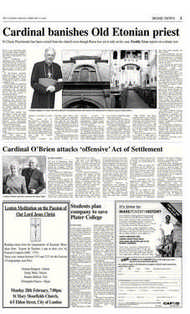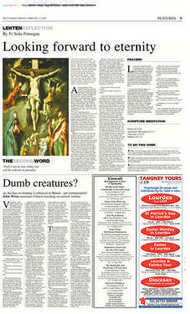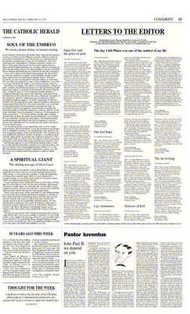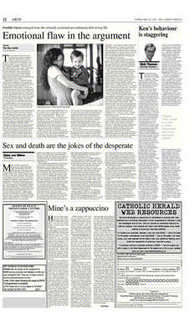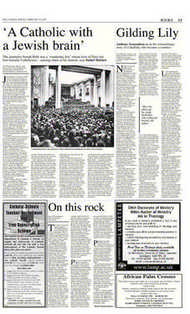Page 4, 18th February 2005
Page 4

Report an error
Noticed an error on this page?If you've noticed an error in this article please click here to report it.
Tags
Share
Related articles
Holy See Accuses Britain Of Breaching Diplomatic Treaty
How The Pope Freed The Hostages In Iran
Nuclear Iran Talks Peace With Vatican
Catholic Life
Britain Puts Embassy To Holy See On The Market
Anger as Britain moves Vatican embassy
Edward Pentin’s Vatican Notebook
The radical cutbacks to Britain’s embassy to the Holy See are being greeted with a mixture of sadness and bewilderment by many of Rome’s diplomatic community, as well as growing doubts about Britain’s overall commitment to the Holy See.
“That’s just too bad,” said one foreign diplomat on hearing the news. “It’s irrational from a diplomatic mission point of view”.
Another diplomat was more pointed: “For all intents and purposes, Britain will have closed its embassy to the Holy See,” he said.
Under the plans, both the embassy’s prestigious Rome offices overlooking the Spanish Steps and the ambassador’s residency off the Via Appia are set to go. From April, it is expected that the offices will move to, of all things, an “old stable block” annexe in the compound of Britain’s embassy to Italy. The change will mean that, unlike almost all other nations’ consulates, the embassy will no longer be a truly independent presence. It is not clear where the ambassador’s new residence will be, although some sources suggest that there may be a swap with the residence of the British ambassador to Italy, the historic Villa Wolkonsky premises currently occupied by Ambassador Sir Ivor Roberts.
The Foreign Office gives “security reasons” for the changes and continues to stress areas of convergence with the Holy See. In particular, the FCO singles out the Church’s positions on poverty and climate change on which it hopes to work closely with the Holy See during Britain’s presidency of both the European Union and the G8 group of industrialised nations.
Yet there are glaring inconsistencies on the Government’s part. Recruiting the next ambassador locally and not from the diplomatic service shows a lack of commitment from London as career diplomats are usually individuals of “tremendous standing”. The current ambassador, Kathryn Colvin, is said to be no exception. “She’s one of the most effective ambassadors currently assigned to the Holy See,” said one Vatican insider. “She’s clearly got very influential contacts in London and exploits them to the fullest extent. She has real clout and is one of the few people to enjoy the ear of the Prime Minister and the Chancellor.” Since April last year, Ambassador Colvin has been under severe strain without a deputy ambassador and forced to continue with minimal support from London. Mrs Colvin led a valiant campaign to increase resources but to no avail. At one point, the embassy was so starved of resources that staff complained of an inadequate supply of toilet rolls.
The embassy is in a unique situation in comparison with other countries of Britain’s diplomatic standing: the US embassy has four diplomatic staff and is increasing in size. Australia is the only leading industrialised country not to have an ambassador, but the government still keeps a well-supported Rome-based Chargé d’Affaires assigned to the Holy See.
Furthermore, almost all embassies have distinctly separate identities to their sister missions to Italy that are also based in Rome. Germany, Spain, and France, for example, all have separate missions headed by at least two diplomats. The United States, arguably the most security conscious of all, has no intention of bringing both its Rome embassies within one compound. Both of Israel’s embassies are within the same premises, but this is for obvious long-standing security concerns.
Many in Rome are therefore sceptical about the Government’s intentions. More likely, some say, the cuts are being made solely for financial reasons. Yet the savings made will barely scratch the surface of the Foreign Office’s enormous budget. “If they wanted savings why didn’t they look at some of the big posts in Europe?” asked one former diplomat. “They could have started in Rome where the Embassy to the Quirinale [British Embassy to Italy] seems to grow by the week.” There is, therefore, a general feeling that the Government is not being straightforward, and until London becomes clearer about its intentions, a large question mark will continue to hang over the true nature of the Government’s relationship with the Holy See.
blog comments powered by Disqus




